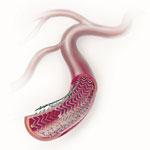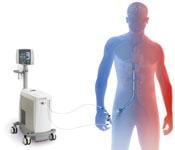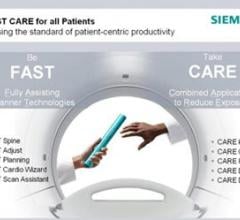
In recent years, advanced visualization has also become more accessible and prevalent. What used to be a niche technology, available only on dedicated and expensive workstations, has become very common. The software is now included in most workstations and multi-site picture archiving and communications systems (PACS).

A drug-eluting, self-expanding stent that does not use a drug-carrier polymer is before the U.S. Food and Drug Administration (FDA) final pre-market approval (PMA) review and a decision is expected later this year. Its chances of approval appear very bright, considering its positive clinical trial data to date.

Navigating through the world of coronary stents is about to become more complex. A plethora of new products are on the horizon, which will utilize new platforms and alloys and present novel options in polymer technology. Whilst most of the new stents will upgrade the platform and polymer, the choice of drug is not changing in most cases. This new generation of drug-eluting stents (DES) promises increased deliverability and radial strength in the platform. New polymers will minimize the concerns around late stent thrombosis (LST) and the need for long-term dual antiplatelet therapy (DAPT). A bioresorbable drug-eluting scaffold also may be game changer in the treatment of coronary artery disease.
Cardiac PET/CT represents a major advancement in cardiovascular diagnostics, offering significant clinical and ...

Catheter-based intra-cardiac echocardiography (ICE) is an imaging modality similar to intra-vascular ultrasound (IVUS). It allows imaging inside the heart to visualize cardiac structures and blood flow using Doppler imaging. The standard-of-care for this type of imaging is usually transesophageal echo (TEE), but ICE proponents say the intra-cardiac modality has several advantages.

Hypothermia for out-of-hospital and in hospital cardiac arrest has been demonstrated to have significant survival and neurologic benefits. While the data supporting its use in the cardiac cath lab is limited and the number of patients where this protocol would be potentially useful is small – STEMI patients surviving cardiac arrest with persistent comatose state after ROSC – the potential benefit to our patients is extremely high and in our opinion well worth the effort.
These are some of the top cardiology technology news items from the spring and early summer 2011. As part of its efforts to expand integration of intravascular ultrasound (IVUS) image guidance with cath lab treatment devices, Volcano Corp. recently announced a supply agreement with ev3, a Covidien company. Volcano will supply its IVUS technology for use in ev3’s TurboHawk plaque excision (atherectomy) systems.
SPONSORED CONTENT — Studycast is a comprehensive imaging workflow system that allows healthcare professionals to work ...
Computed tomography angiography (CTA) is one of the most complex procedures routinely performed on a CT scanner. A ...
July 15, 2011 — TeraRecon Inc. will highlight the accessibility and clinical workflow impact of its iNtuition solution at the sixth annual scientific meeting of the Society of Cardiovascular Computed Tomography (SCCT) at the Hyatt Regency Denver at Colorado Convention Center in Denver, Colo., July 14-17, 2011.
Canada is spearheading an international study to determine if an implantable cardioverter defibrillator (ICD) can prevent death from serious heart rhythm problems in those patients who’ve survived a heart attack. Heart disease is a leading cause of death in Canada and the fastest growing disease worldwide.
Providing exceptional cardiovascular care for patients to achieve the best possible outcomes is the number one goal for ...
July 15, 2011 — Attendees at the 2011 annual scientific meeting of the Society of Cardiovascular Computed Tomography (SCCT), July 14-17 at the Colorado Convention Center in Denver, will learn how Siemens Healthcare facilitates “Sustainable Cardiovascular Care” through its portfolio of products and services, including the Somatom Definition Flash CT scanner and <i>syngo</i>.via imaging software.
The National Aeronautics and Space Administration (NASA) selected GE Healthcare’s Vivid q cardiovascular ultrasound system for delivery to the International Space Station (ISS) on its final space shuttle flight. The Vivid q launched on the space shuttle Atlantis July 8.
July 15, 2011 — In a true hybrid suite, both cath lab and open surgical procedures are performed in a single room. In creating hybrid cath labs, healthcare facilities require imaging technologies that provide the flexibility to quickly and easily access both the patient and ancillary equipment. Arnold Palmer Hospital for Children in Orlando, Fla., a leading children’s hospital, recently installed Toshiba America Medical Systems Inc.’s Infinix CF-i bi-plane system with the CAT-880B hybrid catheterization table for its new dedicated hybrid suite. When combining the five-axis positioner of the Infinix-i system with the tilting and cradling features of the hybrid table, physicians are able to obtain optimal image angles while having unprecedented patient access.
Cardiac positron emission tomography (PET) is growing in popularity among cardiologists because it provides the ability ...

Carotid stenting is a more complex and challenging procedure than coronaries or peripheral vessels. Carotid stenting experts have the following advice for hospitals and physicians that want to enter this market.

In a move that will likely have a significant impact on how many patients are treated for carotid artery disease, the U.S. Food and Drug Administration (FDA) in May cleared the use of a stent to treat standard-risk surgical patients. Prior to this approval, carotid stenting was only indicated for use in high-risk surgical patients who were often denied the standard-of-care of carotid endarterectomy surgery. The decision to expand the indication for the Abbott RX Acculink carotid stent system is expected to have a major impact, offering patients the option of minimally invasive stenting rather than open surgery, which often leaves scars on the patient’s neck.
July 14, 2011 – Cambridge Heart Inc., a developer of non-invasive diagnostic tests for cardiac disease, announced that it has reached an agreement with its original equipment manufacturing (OEM) partner, Cardiac Science Corporation, to include Cambridge Heart’s proprietary microvolt T-wave alternans (MTWA) module on every new Q-Stress system sale beginning July 11, 2011. The company expects this initiative to significantly increase the placement of MTWA modules in coming quarters, which Cambridge Heart anticipates will provide the basis for future recurring revenue.

 July 15, 2011
July 15, 2011









